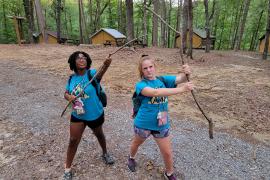Camp is more than just a place for outdoor adventure, silly songs, and late-night campfires; it’s a space where meaningful connections are made and lifelong memories are created. As a camp counselor, you play a crucial role in shaping the experience for every camper you interact with.
Beyond leading activities and enforcing rules, your job is to be a mentor and a role model. Most importantly, you must be a source of support for your campers and fellow staff members. One of the most powerful tools you can bring to camp is empathy. This is the ability to step into someone else’s shoes and truly understand what they are going through.
Empathy isn’t just about being kind or offering a quick word of encouragement; it’s about fostering deep connections and building trust. You must create an environment where everyone feels safe and valued. When campers see that you genuinely care about their feelings and experiences, they are more likely to engage and thrive in the camp setting. Likewise, when you extend empathy to your fellow counselors, it strengthens the team dynamic and ensures a more supportive and enjoyable summer for everyone. So, whether you’re helping a homesick camper, resolving a conflict between peers, or supporting a struggling co-counselor, empathy will be the key to making a meaningful impact this summer.
Before we dive into how to cultivate empathy at camp, let’s first clarify the difference between empathy and sympathy. These terms are often used interchangeably, but they mean very different things.
Sympathy is feeling sorry for someone. It’s recognizing someone’s pain but keeping a certain emotional distance. For example, if a camper is homesick, you might sympathetically say, “That sounds really tough. I hope you feel better soon.” While this acknowledges their struggle, it doesn’t create a real connection.
Empathy, on the other hand, is feeling with someone. It’s about stepping into their shoes, understanding their emotions, and offering support in a way that shows you truly see and hear them. If a camper is struggling with homesickness, an empathetic response might be: “I totally get it. What’s something that makes you feel comfortable when you’re at home?” This response builds a bridge between their emotions and yours, helping them feel less alone.
At camp, empathy is key because it creates trust and builds deeper connections. It can help both campers and counselors feel valued. Now, let’s explore how you can make empathy a daily practice in your role.
Empathy is what allows you to recognize when a camper is struggling, when a co-counselor needs support, or when a group dynamic needs a little extra care. At camp, empathy helps you:
- Build trust with campers, especially those who may be homesick or nervous
- Foster teamwork with your fellow staff members
- Create an environment in which everyone feels seen, heard, and supported
- Improve communication, helping to resolve conflicts quickly and effectively
- Enhance leadership skills by making you more attuned to others’ needs and emotions
Here are six steps that break down how you can actively incorporate empathy into your daily interactions at camp.
1. Start with Stories
Think back to a time when someone really understood what you were going through. Maybe it was a friend who listened when you were having a rough day or a teacher who supported you when you struggled. That feeling of being understood is exactly what you can provide for your campers and team members.
Example Scenarios:
- A camper with a sensory processing disorder becomes overwhelmed during a loud campfire event. How do you help them feel safe while keeping the group engaged?
- A co-counselor seems distant or withdrawn. How do you check in and offer support?
- A camper feels left out during group activities. How can you ensure they feel included?
- A fellow staff member seems frustrated or exhausted. How do you approach them with empathy?
Talk through these kinds of scenarios with your team, and practice responding in ways that show understanding and care.
2. Practice Active Listening
Empathy starts with listening — not just hearing someone’s words but truly understanding what they mean. Here’s how you can improve your listening skills:
- Give your full attention. Put down phones and clipboards and block out other distractions; make eye contact.
- Reflect back feelings. Say things like, “It sounds like you’re feeling frustrated because . . . ”
- Pause before responding. Sometimes, people just need space to express themselves.
- Ask clarifying questions. If a camper is upset, try saying, “Can you tell me more about what’s bothering you?”
- Be patient. Some people need time to open up, so give them space while showing you’re available to listen.
- Try pairing up with another counselor and taking turns sharing something important. Practice listening without interrupting or offering advice — just acknowledge their feelings.
3. Step into Someone Else’s Shoes
Before reacting to a challenging camper or stressful situation, take a moment to ask yourself:
- What might this person be feeling right now?
- What’s going on beneath the surface?
- How can I respond in a way that supports them?
For example, if a camper refuses to participate in an activity, instead of assuming they’re being difficult, consider that they might be feeling shy, overwhelmed, or unsure. A simple, “Hey, I see you’re not into this right now. What’s up?” can open the door to a deeper conversation.
4. Model Empathy Every Day
Your campers are always watching and learning from you. Show them what empathy looks like by:
- Checking in with your co-counselors and offering help when needed
- Responding to challenges with patience rather than frustration
- Owning your mistakes and apologizing when necessary
- Encouraging campers to support one another and celebrating their acts of kindness
- Engaging in small gestures, such as a high-five, a reassuring smile, or an encouraging word
5. Create a Supportive Culture
Empathy isn’t just about how you interact with campers — it’s also about how you support your fellow staff. Camp can be exhausting, and everyone will have tough days. Here’s how you can make a difference:
- Be there for each other. Notice when a co-counselor is struggling, and offer a listening ear.
- Share your experiences. It’s OK to admit when you’re having a tough time too.
- Encourage and celebrate. Recognize moments when others show empathy, and lift each other up.
- Foster inclusivity. Be mindful of new staff members who may feel out of place, and help them integrate into the team.
6. Keep It Going All Summer
Empathy isn’t a one-time thing; it’s a mindset that shapes how you approach every situation. Throughout the summer, take time to reflect on how you’re practicing empathy:
- Do weekly check-ins. Talk with co-counselors about what’s going well and what challenges you’re facing.
- Celebrate the wins. Recognize when someone steps up and shows empathy.
- Ask for feedback. Let your teammates know you’re always looking to improve.
Being an empathetic camp counselor isn’t about having all the right answers; it’s about being present, listening, and showing that you care. By making empathy a daily habit, you’ll create a camp experience that is both fun and meaningful.
|
Discussion Questions
|
Photos courtesy of Camp Romaca, Hinsdale, MA; Camp Friendship, Palmyra, VA.
Michael Garcia is the founder of Youth Development Pro, LLC and has three decades of experience in summer camp and youth development. He has consulted with multiple camps to support their alignment of mission and financial goals. His work emphasizes creating positive, mission-driven spaces for young people to thrive (youthdevelopmentpro.com).



